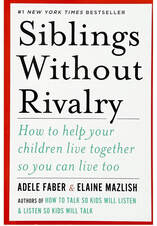The book is structured from the point of view of the author leading a support group of parents who are there to talk about the issues they are having with their children. Each class sets out to talk about a different subject, such as comparison of siblings, fighting between siblings, jealousy, etc. As the class progresses the author allows the parents to sometimes lead the subject into areas she hadn’t intended, but that are sometimes even more meaningful.
The subject of siblings does relate to childhood trauma in that sometimes a parent can create such animosity between children, or toward one child, that it really becomes a form of emotional abuse. In years past this probably wouldn’t have been recognized. There are many adults today who have suffered from a parent’s preference of one child over another. These wounds can be deep and can affect adult relationships. Some of the takeaways I gleaned from this book include the fact that parents can use comparisons in two ways. She can either praise one child to make the other child feel bad – usually trying to motivate the child to do better. Or a parent can put down one child while trying to make the other child feel better about himself. In either case, both children will suffer. The praised child suffers just as much as the put down child because comparison will destroy the potential joy of the sibling relationship. It will cause resentment among siblings that may last into adulthood. It is possible to motivate our children and to praise our children while treating them as an individual, not in comparison to someone else. There are many other subjects discussed, such as whether it’s necessary to always give every child the same things – it’s not, and how to handle frequent fighting – teach them to work it out themselves in a safe way. It also mentioned the affect that a sibling with special needs can have on the family and explored the best ways to include that child without having a negative effect on the siblings. In all, it was a very helpful book for parents. However, it could also be a helpful book for any adult who has had a difficult relationship with a sibling or parent. Many of these issues were explored in an easy-to-read way. If you are like me and don’t have time to read, you can also check out the audio book! Happy reading! Laura Shamblin, MD
0 Comments
Leave a Reply. |
Laura Shamblin, MDEditor-in-chief of TraumaInformedMD.com Archives
April 2022
Categories |


 RSS Feed
RSS Feed